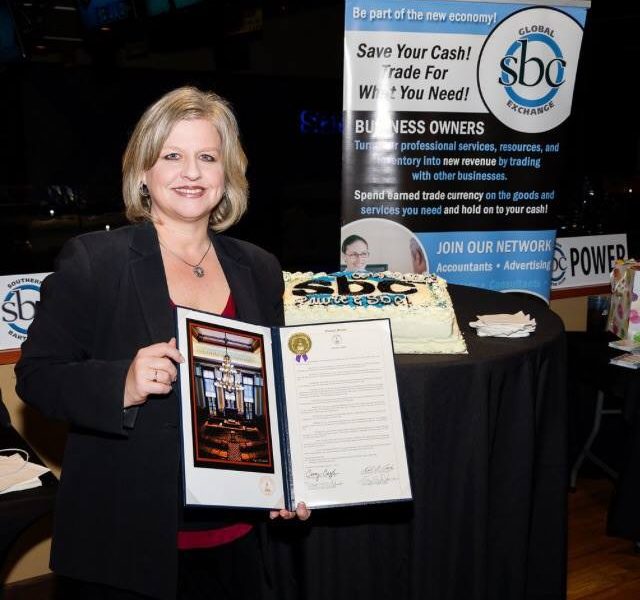

Today we’d like to introduce you to Laurie Sossa.
Laurie, let’s start with your story. We’d love to hear how you got started and how the journey has been so far.
My background is in qualitative market research, consumer packaged goods and distribution. I also had a sample boutique business where I would buy samples from manufacturers whether it be boutique clothing or décor or furniture and sold it to the public at wholesale. I always saw the value in leveraging resources and assets and integrated barter into my everyday business models. If I had a conference room in my office, why not leverage that to a local magazine that could use it and receive magazine advertising for the same value of what I could rent it for? If I needed an exterior sign and I knew the owner of the sign company had a family, why not offer to pay for the sign in kind where he could choose clothing, décor and furniture for the same value of the sign? Both parties were still getting paid for their goods and services in a sense, it reserved my cash and it would always lead to referrals to cash-carrying customers. The essence of bartering is simply to trade something you have for something you want or need – and you can do this whether you are struggling financially or have a healthy steady income.
When my husband and I sold our market research company back in 2008 and entered into a non-solicit and non-compete agreement, we had to find another industry to be in. Since I naturally was a connector and loved to barter, I wanted to form a professional barter club where I could facilitate trades helping businesses use their goods, services, resources and underutilized assets to earn spending power in a barter network. Realizing the limitations of one on one bartering where we call it “the incidence of coincidence”, we sought to create our own trade currency where the trade dollar was equivalent in value to a cash dollar. We decided to set up a business barter membership network where members could sell and spend using a cashless currency in lieu of cash. As an example, the jewelry store owner could sell an attorney in the network, a necklace for $1000 trade dollars that he otherwise would sell to his own customers for $1,000 cash dollars. He agrees to accept trade dollars because it is business sent his way that he otherwise would not have and that was earned at this cost of doing business (he went to the mart and spent $500 cash for the necklace but will yield spending at full retail in the barter network for $1000) The seller virtually banks the $1000 trade dollars for future use when they can spend their banked trade dollars with another member of the barter network that they want to trade with. In the instance when someone is approached by a business owner that may want to trade with them but for whatever reason may not be interested in what they had to offer as payment or what they had to offer as payment was not equal in value to what would be traded, using virtual currency opened up a lot of business opportunities with less limitations. The trade could still happen when the seller agrees to receive trade dollars instead of actual goods or services. The buyer with the help of a barter broker will sell his goods or services to earn trade dollars then they can spend them with the jeweler. Fast forward to 2017, our SBC name is synonymous with business, finance, entrepreneurship. We have grown to 1,000 members.
We’re always bombarded by how great it is to pursue your passion, etc. – but we’ve spoken with enough people to know that it’s not always easy. Overall, would you say things have been easy for you?
When my husband and I decided to start a barter club we had to start from scratch. It was not a franchise that would simply come with a business manual and training. We had to do our own research and write our business plan and create our own business model and strategy and basically learn along the way what worked and what didn’t work. The biggest challenge was that we were starting a membership network and we had no members and generally there was a misnomer on how a barter club operates. Who would be our first member and how would we get them to join when we did not have a valuable membership list yet? So we did guerilla marketing and we did educational awareness campaigns and forums and basically lots of networking forming new relationships and building on them. When I am asked what business I am in, I say I’m in the relationship business. and I also do barter! Once we got momentum and as the years passed and our network increased and our relationships flourished it got easier.
We’d love to hear more about your business.
We are a barter business membership network in which all members agree to barter with another business that SBC introduces them to if /when they want barter business. All members sell and spend virtual cashless currency with participating business members. We are a third-party record keeper that manages all the debits and credits in our cashless economy. We send real time receipts and monthly statements as well as 1099’s (barter is reportable income to IRS.) We have an online platform for user profile, a barter store where members list offers, transaction history, a local membership list as well as global list of businesses that belong to other barter clubs around the world that we reciprocate with. We specialize in strategic funding, we are known for helping entrepreneurs and start ups as well as nonprofits minimize their cash outlay by leveraging their goods and professional services as well as available and underutilized assets so that they can earn spending power in our barter network.
What our company SBC does is help businesses gain new clients which leads to word of mouth advertising while they earn full retail spending power in a global barter network. We also connect businesses to form tech or strategic alliances. It’s always business they would not have had otherwise. Bartering helps a business gain a competitive edge, free up cash flow, minimize cash outlay, maximize profits.
I am very proud of the name and reputation that I have for myself and my organization. In December 2016, we were selected by John Hopkins University to include SBC in a study on barter. They interviewed members of SBC and conducted in person ethnographic interviews at our year end barter expo. In March 2017, I received a resolution from the State of Georgia commending my work mentoring, educating and empowering women, entrepreneurs, nonprofits, and local business. The Southern Barter Club was recognized for stimulating commerce and trade in Georgia and was referred to as one of the most dynamic and committed civic organizations in Georgia that provides continuing innovation in the barter and trade industry.
What were you like growing up?
I grew up in Queens, New York. I come from a close-knit family, my parents are both creative and artistic and so I get my creative side from them. My first job was working right from home as a teen. My mom was a supervisor for a medical insurance company and with training from my mom I learned to proofread reports that she would bring home for me. I did not have the average vocabulary at 15 years old proofreading words like spondylolisthesis and radiculopathy! This taught me early on how to be a self-starter, work independently and just how important correct spelling, grammar and punctuation are in business. I always knew that I would have my own business one day.
Pricing:
- Use PROMO CODE: voyageAtl to receive $100 off membership (only $199 vs $299)
Contact Info:
- Website: www.southernbarterclub.com
- Phone: 678-546-0900
- Email: info@southernbarterclub.com
- Facebook: https://www.facebook.com/groups/southernbarterclub
- Twitter: https://twitter.com/SouthernBarter








Image Credit:
Paul Biagi Photography
Faith Swift Photography
Jared Zem Photography
Getting in touch: VoyageATL is built on recommendations from the community; it’s how we uncover hidden gems, so if you know someone who deserves recognition please let us know here.



















